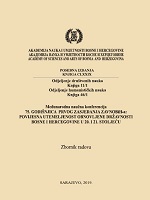ZAŠTO JE, I KOMU, ZAVNOBIH SPORAN?
WHY AND TO WHOM IS THE STATE ANTIFASCIST COUNCIL FOR THE NATIONAL LIBERATION OF BOSNIA AND HERZEGOVINA (SACNLBH) DISPUTABLE?
Author(s): Ivan Cvitković
Subject(s): Politics, Political history, Nationalism Studies, WW II and following years (1940 - 1949), Fascism, Nazism and WW II, Sociology of Religion, Identity of Collectives, Wars in Jugoslavia
Published by: Akademija Nauka i Umjetnosti Bosne i Hercegovine
Keywords: ZAVNOBIH; Bosnia and Herzegovina; Nationalism; “national key”; Identities; Religion;
Summary/Abstract: Political situation in Bosnia and Herzegovina during SACNL BIH and today (nationalism; dying of one state and emergence of the other; the change of values; seeking for political aliens outside Bosnia and Herzegovina; SACNL BiH was the alternative, is there an alternative today; fear; illusions of “our” truth). Has the national key become “rusted”? (Constitution from 1910; is it possible to neglect the national key in a country in which 96% of its population declares themselves as Bosniacs, Croats and Serbs; does today’s politics know how to treat national and religious identities). O kindred, let me make a poem about the language to you, the stupid language of yours and the wise one of mine – Krleža (How had the SACNL BIH treated the issue of the language and how do today’s politicians do it). How had SACNL BIH determined Bosnia and Herzegovina? (A review of documents, presentation by R. Čolaković). A stand view of the most prominent Serbian and Croatian politicians towards Bosnia and Herzegovina in 1943 and today (stand views of Đ. Pucar, R. Čolaković, N. Mastilović, B. Brajković, J. Grgurić and attitudes of today’s politicians towards Bosnia and Herzegovina). An attitude of SACNL BIH towards the religion (participation of priests in sessions of SACNL BIH; a stand view of the Partisan movement towards practising religion; establishment of Commission for religious affairs; about a religious education in schools). Concluding considerations.
- Page Range: 327-344
- Page Count: 18
- Publication Year: 2019
- Language: Croatian
- Content File-PDF

